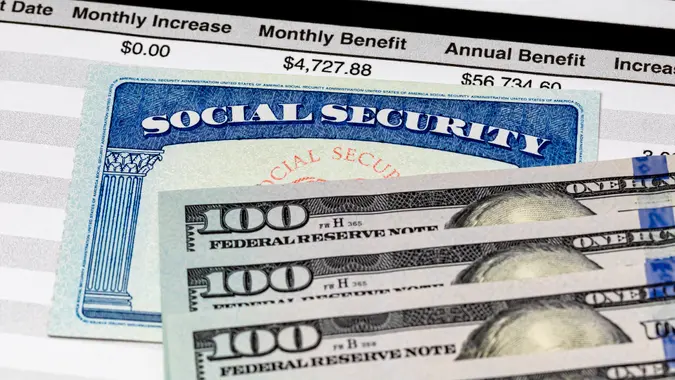Should You Try This Retirement ‘Cheat Code’ That Could Beat a 401(k)?

Commitment to Our Readers
GOBankingRates' editorial team is committed to bringing you unbiased reviews and information. We use data-driven methodologies to evaluate financial products and services - our reviews and ratings are not influenced by advertisers. You can read more about our editorial guidelines and our products and services review methodology.

20 Years
Helping You Live Richer

Reviewed
by Experts

Trusted by
Millions of Readers
The Health Savings Account (HSA) was originally intended to provide tax benefits to those saving for uncovered medical expenses. But since its tax advantages are so generous, some account holders have begun using the accounts as supplements to or even replacements for accounts like 401(k) plans.
While each of these types of accounts have their own benefits as well, the HSA is the only one that can be triple tax-free, allowing for tax deductible contributions, tax-free growth and tax-free distributions, when used in accordance with IRS rules. In addition, there’s another hidden advantage to contributing to an HSA that many overlook, dubbed the “cheat code” by financial coach Blake Hilgemann.
What Is the HSA ‘Cheat Code
Although there are numerous differences between HSAs and 401(k) plans, they both allow for the tax-deductibility of contributions and the tax deferral of earnings growth. But the “cheat code” that gives HSAs a huge advantage, as identified by Hilgemann, is that HSAs are not subject to Social Security taxes.
What this means is that by contributing to an HSA, not only do you get a regular tax deduction, but you also avoid the 7.65% in payroll taxes that employees pay on their earnings. If you’re in even the lowest tax bracket, which is currently 10%, that means your contributions to an HSA save you a whopping 17.65% in taxes.
If you’re self-employed — or in a higher tax bracket — things look even rosier. Since self-employed individuals have to pay both the employer and the employee portions of the payroll tax, they end up paying 15.3% of their taxable earnings. But if you are self-employed and contribute to an HSA, you’ll save 15.3% plus whatever your tax bracket is, for a minimum of 25.3%. If you’re in a higher tax bracket, you’ll save even more. Earnings between $44,725 and $95,375 as a single put you in the 22% bracket for 2023, meaning your HSA contributions could save you 37.3% in taxes if you’re self-employed.
What Are the Drawbacks?
While this retirement “cheat code” is a nifty little tax trick, it doesn’t necessarily mean that HSAs are a better option than 401(k) plans. In fact, there are some notable drawbacks, including the following.
Lower Contribution Limits
For 2023, employees can contribute up to $22,500 to a 401(k) plan, or $30,000 if they are age 50 or older. HSAs, on the other hand, have contribution limits of just $3,850 for an individual, or $7,700 for a family.
Mandatory High-Deductible Health Plan
To contribute to an HSA, whether through your employer or on your own, you must participate in a high-deductible health plan. For 2023, a plan must have an individual deductible of $1,400 or a family deductible of $2,800 to qualify as a high-deductible health plan.
No Employer Match (Generally)
One of the biggest advantages a 401(k) has over an HSA is the employer match. Most employers offering a 401(k) will also contribute to employee accounts on their behalf. A typical match might be 50% to 100% of the first 3% to 6% of earnings that an employee kicks in.
While technically an employer can contribute to an employee HSA, these programs are much less common. This is partly because large employers tend to offer medical insurance with low deductibles to employees, which negates the availability of HSAs.
Restrictions on Usage of Funds
If you withdraw money from an HSA for anything but qualifying healthcare expenses, you’ll pay a 20% penalty on your distribution. This can negate most of the tax benefits you derive from the HSA. However, after age 65, you are allowed to use HSA withdrawals for any purpose with no penalty.
Limited Investment Options
Although some 401(k) plans have limited options as well, many health savings accounts don’t even offer the ability to invest your funds. When used for paying healthcare expenses, this isn’t necessarily a bad thing, as it prevents inexperienced investors from blowing away their health savings.
But for those planning to leverage the power of the HSA as an alternate retirement plan, this restriction can be crippling. It’s important to note, however, that there are a growing number of HSAs that now do offer investment options, so be sure to shop around if you’re going down this path.
Should You Use the HSA ‘Cheat Code’?
Although a 401(k) has some inherent advantages over an HSA, the “cheat code” is a great tool if you’re in a position to use it, primarily for its huge tax benefits. Assuming you qualify, there’s nothing to prevent you from using both a 401(k) and an HSA, so that may be the best option if you’re in a position to sock away enough money.
More From GOBankingRates
 Written by
Written by  Edited by
Edited by 

























